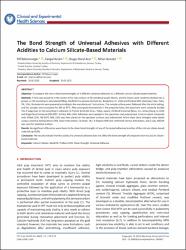| dc.contributor.author | Kalyoncuoğlu, Elif | |
| dc.contributor.author | Keskin, Cangül | |
| dc.contributor.author | Gönülol, Nihan | |
| dc.contributor.author | Acar, Duygu | |
| dc.date.accessioned | 2022-09-06T20:11:09Z | |
| dc.date.available | 2022-09-06T20:11:09Z | |
| dc.date.issued | 2021 | en_US |
| dc.identifier.citation | KALYONCUOĞLU E,KESKİN C,ACAR D,GÖNÜLO N (2021). The Bond Strength of Universal Adhesives with Different Acidities to Calcium Silicate-Based Materials. Clinical and Experimental Health Sciences, 11(1), 170 - 174. Doi: 10.33808/clinexphealthsci.740487. | en_US |
| dc.identifier.issn | 2459-1459 / 2459-1459 | |
| dc.identifier.uri | https://doi.org/10.33808/clinexphealthsci.740487 | |
| dc.identifier.uri | https://hdl.handle.net/20.500.12712/33438 | |
| dc.description | Tam Metin / Full Text | en_US |
| dc.description | ESCI | |
| dc.description | WOS:000636479400026 | |
| dc.description.abstract | To compare the micro-shear bond strengths of 3 different universal adhesives to 2 different calcium silicate-based materials. Methods: A hole was prepared in the center of the top surfaces of 60 cylindrical acrylic blocks, and the blocks were randomly divided into 2 groups (n=30) according to biomaterial filling; NeoMTA Plus (Avalon Biomed Inc. Bradenton, FL, USA) and ProRoot MTA (Dentsply Tulsa, Tulsa, OK, USA). Biomaterials were prepared according to the manufacturers’ instructions. The sample surfaces were flattened after the initial setting, and the samples were incubated for 24h at 37°C. After placing the biomaterials in the prepared holes, the specimens were randomly divided into 3 subgroups (n=10) according to adhesive; G-Premio Bond (GC Corp., Tokyo, Japan), All-Bond Universal (Bisco, Inc., Schaumburg, IL, USA) and Single Bond Universal (3M ESPE, St Paul, MN, USA). Adhesives were applied to the specimens and polymerized. A micro-hybrid composite resin (Filtek Z250, 3M ESPE, MN, USA) was then placed on the specimen surfaces and polymerized. Micro-shear bond strengths were tested using a universal testing device (LRX, Lloyd Instruments, Farnham, UK). A Shapiro-Wilk test confirmed normal distribution, and 2-way ANOVA was used for statistical analysis. Results: No significant differences were found in the shear bond strengths of any of the tested adhesives to either of the calcium silicate-based materials (p>0.05). Conclusion: The results indicate that the acidity of a universal adhesive does not affect the bond strength of composite resin to calcium silicatebased materials. | en_US |
| dc.language.iso | eng | en_US |
| dc.publisher | Marmara Üniversitesi | en_US |
| dc.relation.isversionof | 10.33808/clinexphealthsci.740487 | en_US |
| dc.rights | info:eu-repo/semantics/openAccess | en_US |
| dc.subject | calcium silicate | en_US |
| dc.subject | neomta | en_US |
| dc.subject | proroot mta | en_US |
| dc.subject | shear strength | en_US |
| dc.subject | universal adhesive | en_US |
| dc.title | The bond strength of universal adhesives with different acidities to calcium silicate-based materials | en_US |
| dc.type | article | en_US |
| dc.contributor.department | OMÜ, Diş Hekimliği Fakültesi, Endodonti | en_US |
| dc.contributor.authorID | 0000-0002-4264-2701 | en_US |
| dc.contributor.authorID | 0000-0001-8990-4847 | en_US |
| dc.contributor.authorID | 0000-0002-7046-7154 | en_US |
| dc.contributor.institutionauthor | Kalyoncuoğlu, Elif | |
| dc.contributor.institutionauthor | Keskin, Cangül | |
| dc.contributor.institutionauthor | Gönülol, Nihan | |
| dc.identifier.volume | 11 | en_US |
| dc.identifier.issue | 1 | en_US |
| dc.identifier.startpage | 170 | en_US |
| dc.identifier.endpage | 174 | en_US |
| dc.relation.journal | Clinical and Experimental Health Sciences | en_US |
| dc.relation.publicationcategory | Makale - Uluslararası Hakemli Dergi - Kurum Öğretim Elemanı | en_US |
















